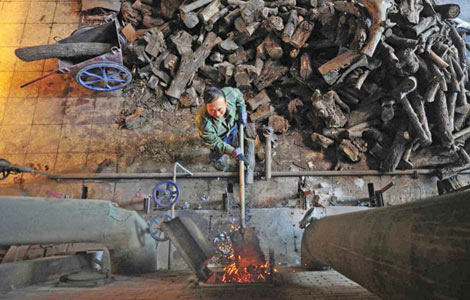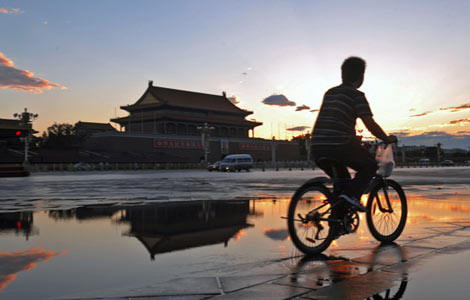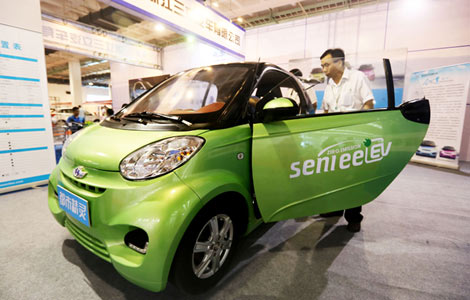Balancing needs of filial piety and work a challenge
Updated: 2013-10-14 06:56
By Xiao Lixin (China Daily)
|
||||||||
The concept of the traditional Chinese family has undergone radical changes because of the influence and irreversible trend of rapid economic development, which has given rise to the nuclear family. The family planning policy and social mobility, accelerated by urbanization, have helped reduce the structure of three- and even four-generation extended families, replacing them with nuclear families.
The average number of family members dropped from 4.41 in 1982 to 3.10 in 2010. The reduction in family size has curtailed support for the elderly, which was an unwritten law in the traditional family structure.
Since ancient times, Chinese people have believed in the concept of a big family, which is hugely different from that in Western countries. Following the old Chinese saying - filial piety is the most important of all virtues - Chinese people have, as a tradition, believed that it is the duty of grownup children to support and take care of their aging parents. But this long-held tradition faces challenges and has become a hard-to-resolve conflict in today's increasingly utilitarian society.
Some employers are totally indifferent to their employees' family responsibilities and problems and think they or their companies cannot or should not do anything to help them. Worse, they compel their employees to work overtime not only on normal days but also during holidays, and deprive them of their right to get paid leave. As a result, for many workers, annual leave is nothing but wishful thinking.
Given the fierce competition in society, many people, voluntarily or forcibly, tend to put more energy and time to build their career and climb up the socio-economic ladder and live a well-off life even if it comes at the cost of their family and health. Material comfort has become the most important index to measure love and family bond. It is widely believed that money best represents love and devotion to the family.
But material comfort is perhaps not what elderly parents really care about. According to a recent survey, the company of their children tops the list of a majority of elderly people's (as much as 65 percent) needs, followed by physical care. Many elderly parents consider it a luxury (it is also their biggest wish) to have dinner or just a good enough conversation with their children without the latter being distracted by their smartphones or iPads with their innumerable apps.
The fact is that, deprived of their children's company for long, elderly parents could become an emotional wreck. Even if grown children unknowingly neglect their parents, it could hurt them psychologically. Such parents could easily fall victims to insomnia and depression.
Amid all this, a clause in the amended Law on the Protection of Rights and Interests of the Elderly has sparked a heated public debate. The clause says that grown children should regularly visit their parents if do not live with them.
It is undeniable that it is difficult for many people to strike a balance between fulfilling their filial duty and moral responsibility, and meeting their job requirements, which is further complicated by the lack of enough long holidays and the short annual leave they get.
It is not easy to prioritize between career and family life in today's fast-changing, market-oriented world. Many people do feel sorry for being caught up in ebb and tide of today's materialistic society to such an extent that they cannot even recall the last time their entire family sat down together for dinner.
Nevertheless, people have to make efforts to maintain a balance between family and work. Visiting and taking care of parents and relatives frequently, if not regularly, is possible if one has the will to do so. Perhaps people could start by paying sudden visits instead of waiting to meet the emotional needs of their parents until it is too late to even regret.
The author is a writer with China Daily. xiaolixin@chinadaily.com.cn.
(China Daily 10/14/2013 page9)

 Other measures for the capital to become green
Other measures for the capital to become green
 Working group to discuss sea issues
Working group to discuss sea issues
 Draft regulation raises fines for polluters
Draft regulation raises fines for polluters
 Djokovic retains Shanghai Masters title
Djokovic retains Shanghai Masters title
 Colombian takes wingsuit crown
Colombian takes wingsuit crown
 Vietnam buries heroic general
Vietnam buries heroic general
 Road to clean air starts with new energy vehicles
Road to clean air starts with new energy vehicles
 Kite festival held in E. China
Kite festival held in E. China
Most Viewed
Editor's Picks

|

|

|

|

|

|
Today's Top News
Chinese firm joins UK airport enterprise
Senate leader 'confident' fiscal crisis can be averted
Working group to discuss sea issues
Man hospitalized years after amputating own leg
Detained US citizen dies in Egypt
Senate leads hunt for shutdown and debt deal
Riding wave of big bargain buy-ups
Draft rule raises fines for polluters
US Weekly

|

|







